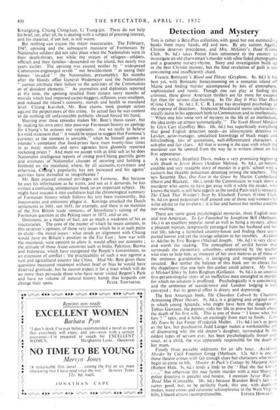Detection and Mystery
THIS is rather a Beta-Plus collection, with good but not outstandin2 books from many hands, old and new. By any canons Agatha
Christie deserves precedence, and Mrs. McGinty's Dead (Crime
Club. 9s. 6d.) takes Poirot from retirement to the country to investigate an old charwoman's murder with so-me faded photographs
and a gruesoine nursery-rhyme. Story and investigation build up in the best Christie manner, but the final revelation of guilt is un- convincing and insufficiently clued.
Francis Bonnamy's Blood and Thirsty (Gryphon. 8s. 6d.) is his best yet, with Bonnamy honeymooning on a romantic island off Maine and finding murder accompanied by lots of atmosphere, sophisticated and rustic. Though one can play at finding the criminal, these glossy American thrillers are far more for escapist fun than for serious clue-hunting. In The Dog It Was That Died (Crime Club. 9s. 6d.), E. C. R. Lorac has developed psychology at the expense of detection. Inspector Macdonald seems uncharacteri- stically naive in his approach both to Communism and to intellectuals. " When one hits some sort of mystery in the life of an intellectual, the idea crops up almost automatically." The Youth Hostel Murders by Glyn Carr (Geoffrey Bles. 10s. 6d.) has superficially everything that good English detection needs—an idiosyncratic detective in Lewker, actor-manager, specialised knowledge of black magic and hill-climbing, lots of quotations, well-differentiated characters, a sub-plot and fair clues. All that is wrong is the ease with which the murderer can be spotted from the way he is written about on his first appearance.
A new writer, Stratford Davis, makes a very promising beginning with Death in Seven Thitirs (Andrew Melrose. 9s. 6d.), an honest, credible and very readable story of murder in a girls' school with a taciturn but likeable policeman detecting among the teachers. The new Saturnin Dax, One Foot in the Grave by Martin Cumberland (Hurst and Blackett. 10s.), sends the Conunissaire to track down a murderer who seems to have got away with it while the reader, w ho knows the truth, is still held eagerly as the sordid Pads trail is retraced. The Clock That Wouldn't Stop by Elizabeth Ferrers (Crime Club. 9s. 6d.) is good pedestrian stuff around one of those nice women who write advice to the lovelorn ; it is fair and honest but neither credible nor exciting.
There are some good psychological mysteries, three English ones and two American. To Let Furnished by Josephine Bell (Methuen. 14s.) is an excellent popular novel as well as being a mystery, about a pleasant woman, temporarily estranged from her husband and her real life, taking a furnished country-house and finding there une■- pected horror and yet the strange solution to her troubles. Accident to Adeline by Eric Burgess (Michael Joseph. 10s. 6d.) is very clever and worth the reading. The atmosphere of sordid horror that surrounds the elementary schoolboy, unperceived by the teacher who tries to help him, as innocent of her own motives as of those of the ominous grandmother, is intriguing and imaginatively con- structed. But neither the balance of this book nor its climax has the shapeliness that one feels this author could achieve. My A'atne is Michael Sibley by John Bingham (Gollancz. 9s. 6d.) is an unusual first-person-singular story of an ineffective man entangled in mUrder for which no solution is proffered. Psychologically it is convincing. and the ambience of seaside-town and London lodging is well conveyed ; but its general effect is dreary and depressing.
The first American book, The Chocolate Cobweb by Charlotte Armstrong (Peter Davies. 9s. 6d.), is a gripping and original story in which young Amanda, who might have been the daughter of Tobias Garrison, the painter, risks her life to prove her hunch about the death of his first wife. This is one of those" I know who, but how ? " tales, and it holds up excitingly from start to finish. Echo My Tears by Jan Foster (Frederick Muller. I Is. 6d.) isn't as good as the last, but psychiatrist Judd Langer makes a workmanlike job of discovering why the old doctor's daughter, surrounded by the oddest types of servant ever, has been psychologically frozen es er since, as a child, she was apparently responsible for the death of her mum.
Finally three passable oddments for an idle hour. Accidental Murder by Cecil Freeman Gregg (Methuen. 12s. 6d.) is one of those theatre crimes with fair enough clues but characters who never begin to come to life. Murder At Puck's Cottage by Marjorie Alan (Robert Hale. 9s. 6d.) tends a little to the " Had she but know n . . .," but otherwise this nice family murder with a nice blue-eed police detective is amiable and honest. I mention Never Wake 4 Dead Man (Constable. 10s. 6d.) because Brandon Bird's last" rather good, but, to be perfectly frank, this one, with duplicatz bodies, treed coons and catatonic schizophrenia in the West Virgirta
hills, I found almost incomprehensible. ESTHER HOWARD.


































 Previous page
Previous page